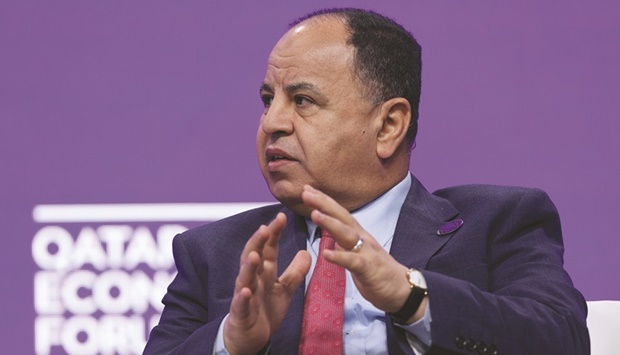Egypt should focus on attracting more foreign direct investment and boosting exports so it relies less on its once-lucrative carry trade, Finance Minister Mohamed Maait said.
The North African country has been racing to limit its exposure to the economic impact of Russia’s invasion of Ukraine, which has imperilled crucial wheat imports and could curb its post-pandemic tourism revival. Egypt’s seen some $20bn in foreign outflows this year as investors in local debt exited what had been a favourite market.
Egypt’s Gulf allies have pledged more than $22bn in deposits and investments since the war began, and Cairo is promising to open sectors and businesses to private foreign and domestic enterprise in the months ahead.
“Now it’s the time for Egypt to concentrate more on the increase of exports and foreign direct investments rather than the carry trade,” Maait said in an interview at the Qatar Economic Forum in Doha.
Maait, who became finance chief in 2018, said Egypt has seen outflows from portfolio investments three times during his tenure and has got “used to dealing with it.”
Egypt saw FDI drop 12% in 2021, but remained one of the continent’s main recipients, according to a report this month from the United Nations Conference on Trade and Development. Pledges from the Gulf may provide a boost, it said.
Looking to a global wave of monetary tightening that’s prompted Egyptian policy makers to follow suit, Maait expressed concern over the impact of high interest rates on the debt-servicing costs for Egypt, one of the Middle East’s most indebted nations.
Egypt has been in talks with the International Monetary Fund for assistance, with recent discussions focusing on a possible three- to four-year program known as an extended fund facility, he said. Maait didn’t say when an agreement might be struck.
Egypt is set to host the COP27 climate summit at the Red Sea resort of Sharm El-Sheikh in November. The Finance Ministry plans a conference in early September with its counterparts from across Africa during which there may be a joint declaration on affordable green-financing, Maait said.
The finance minister also said:
* Costs of oil, wheat and other key commodities are matters of concern, both for the budget and their impact on inflation.
* Further significant interest-rate hikes will bring potentially worrying extra debt-servicing costs.
* Issues such as the war in Ukraine and rising food and energy prices could affect global leaders’ focus on climate and their priorities ahead of COP27.
The North African country has been racing to limit its exposure to the economic impact of Russia’s invasion of Ukraine, which has imperilled crucial wheat imports and could curb its post-pandemic tourism revival. Egypt’s seen some $20bn in foreign outflows this year as investors in local debt exited what had been a favourite market.
Egypt’s Gulf allies have pledged more than $22bn in deposits and investments since the war began, and Cairo is promising to open sectors and businesses to private foreign and domestic enterprise in the months ahead.
“Now it’s the time for Egypt to concentrate more on the increase of exports and foreign direct investments rather than the carry trade,” Maait said in an interview at the Qatar Economic Forum in Doha.
Maait, who became finance chief in 2018, said Egypt has seen outflows from portfolio investments three times during his tenure and has got “used to dealing with it.”
Egypt saw FDI drop 12% in 2021, but remained one of the continent’s main recipients, according to a report this month from the United Nations Conference on Trade and Development. Pledges from the Gulf may provide a boost, it said.
Looking to a global wave of monetary tightening that’s prompted Egyptian policy makers to follow suit, Maait expressed concern over the impact of high interest rates on the debt-servicing costs for Egypt, one of the Middle East’s most indebted nations.
Egypt has been in talks with the International Monetary Fund for assistance, with recent discussions focusing on a possible three- to four-year program known as an extended fund facility, he said. Maait didn’t say when an agreement might be struck.
Egypt is set to host the COP27 climate summit at the Red Sea resort of Sharm El-Sheikh in November. The Finance Ministry plans a conference in early September with its counterparts from across Africa during which there may be a joint declaration on affordable green-financing, Maait said.
The finance minister also said:
* Costs of oil, wheat and other key commodities are matters of concern, both for the budget and their impact on inflation.
* Further significant interest-rate hikes will bring potentially worrying extra debt-servicing costs.
* Issues such as the war in Ukraine and rising food and energy prices could affect global leaders’ focus on climate and their priorities ahead of COP27.

